On June 14, the passengers on The Audacity of Hope sent this letter to Pres. Obama. Copies went to UN Secretary General Ban Ki-moon and 12 members of the Administration and Congressional leadership. Call the White House – 202-456-1111 – and tell them you agree with the letter and expect the U.S. to take action to uphold the rights of peaceful citizens to safe passage on the seas.
Dear Mr. Obama:
We are writing to inform you that 50 unarmed Americans will soon be sailing in a U.S. flagged ship called The Audacity of Hope as part of an international flotilla to Gaza.
Our peaceful demonstration will challenge Israel’s blockade of Gaza, which has effectively imprisoned 1.6 million civilians, almost half of whom are under the age of 16. The blockade has impoverished the people of Gaza, deprived them of needed materials and supplies to rebuild their lives after the Israeli attack of late 2008 – early 2009, impeded those who are ill or infirm from seeking outside medical aid, and prevented students from seeking education outside of Gaza. 45% of the working age population is unemployed.
In addition to 36 passengers, 4 crew, and 10 members of the press, our boat will carry thousands of letters of support and friendship from people throughout the U.S. to the women, children and men of Gaza. There will be no weapons of any sort on board. We will carry no goods of any kind for delivery in Gaza. Our mission is from American civil society to the civil society of Gaza. We do not serve the agenda of any political leadership, government or group. We are engaged solely in non-violent action in support of the Palestinian people and their human rights.
In our country’s great tradition of citizen activists taking nonviolent action to stand up to injustice, we sail in the hope that our voyage will show the people in Gaza that they are not alone, and that it will call attention to the morally and legally indefensible collective punishment of a population of civilians.
Mr. President, you have noted the unsustainability of the Gaza blockade. And your administration has spoken boldly in support of peaceful demonstrations throughout this “Arab Spring.”
As U.S. citizens we expect our country and its leaders to help ensure the Flotilla’s safe passage to Gaza – as our country should support our humanitarian demand that the Gaza blockade be lifted. This should begin by notifying the Israeli government in clear and certain terms that it may not physically interfere with the upcoming Flotilla of which the U.S. boat—The Audacity of Hope — is part. We—authors, builders, firefighters, lawyers, social workers, retirees, Holocaust survivors, former government employees and more—expect no less from our President and your administration.
Our boat will sail from the eastern Mediterranean in the last week of June. We shall be grateful to you for acting promptly and decisively to uphold the rights of civilians to safe passage on the seas.
Sincerely,
The passengers of The Audacity of Hope: Nic Abramson, Hagit Borer, Linda Durham, Ridgely Fuller, Libor Koznar, Richard Lopez, Carol Murry, Gabe Schivone, Len Tsou, Johnny Barber, Regina Carey, Debra Ellis, Megan Horan, Melissa Lane, Ken Mayers, Robert Naiman, Kathy Sheetz, Alice Walker, Medea Benjamin, Gale Courey Toensing, Hedy Epstein, Kathy Kelly, G. Kaleo Larson, Ray McGovern, Henry Norr, Max Suchan, Paki Wieland, Greta Berlin, Erin DeRamus, Steve Fake, Kit Kittredge, Richard Levy, Gail Miller, Ann Petter, Brad Taylor, Ann Wright
On Wednesday, the State Department sent out a “travel advisory” urging Americans not to participate in the Gaza Freedom Flotilla. According to the statement, U.S. citizens are advised against traveling to Gaza by any means, including via sea, noting that previous attempts to enter Gaza by sea “have been stopped by Israeli naval vessels and resulted in the injury, death, arrest, and deportation of U.S. citizens.”
“Apparently, the State Department subscribes to the view that Israel’s anticipated violence against unarmed protesters is an immutable act of nature,” said Hagit Borer, a professor of Linguistics at the University of Southern California and a passenger on the U.S. boat. “This is a remarkable attitude, coming from a government that provides the Israeli government with billions of dollars in military aid and routinely uses its veto to protect the Israeli government from censure of its occupation policies by the UN Security Council.”
Passengers on the boat noted that the U.S. State Department has a legal obligation to act to protect U.S. citizens when they are traveling abroad. “So far, U.S. government officials have failed to use their influence to discourage Israeli authorities from ordering a physical assault on us,” said Just Foreign Policy policy director Robert Naiman, another passenger on the U.S. boat. “Of course, State Department officials have an obligation to speak out against threats to attack us. It is deeply disappointing that they have so far failed to do so.”
[Source: USTOGAZA. Follow on Twitter.]

